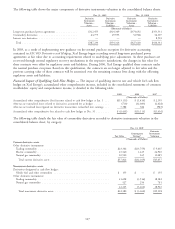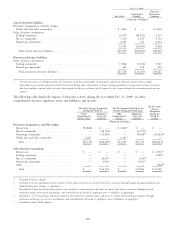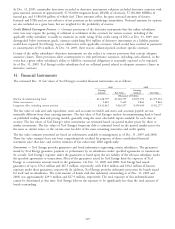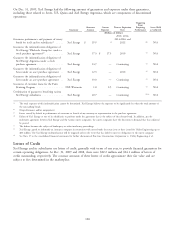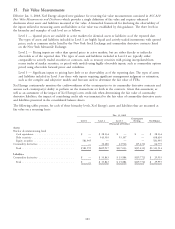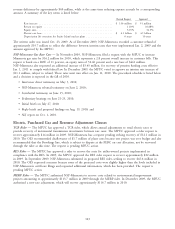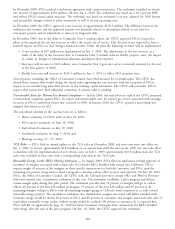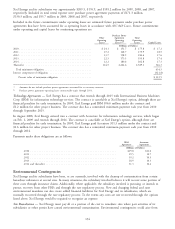Xcel Energy 2009 Annual Report Download - page 135
Download and view the complete annual report
Please find page 135 of the 2009 Xcel Energy annual report below. You can navigate through the pages in the report by either clicking on the pages listed below, or by using the keyword search tool below to find specific information within the annual report.In July 2009, NSP-Minnesota filed with the MPUC a withdrawal of its request to rebill Minnesota customers
experiencing a module failure, which the MPUC approved in October 2009. NSP-Minnesota completed the customer
refunds in January 2010. In November 2009, NSP-Minnesota completed its dispute resolution with its provider of the
AMR modules and meter reading services, and filed a summary of the resolution and proposed disposition of any
proceeds with the MPUC. MPUC action is pending. NSP-Minnesota has determined that a number of AMR modules
designed for commercial customers are defective and as a result broadened its efforts to evaluate the performance of
both gas and electric AMR modules.
Annual Review of Remaining Lives — In February 2009, NSP-Minnesota filed a petition with the MPUC requesting
an increase in proposed service lives, salvage rates and resulting depreciation rates for its electric and gas production
facilities and a depreciation study for other gas and electric assets, effective Jan 1, 2009. In addition, the OES
recommended a 10-year lengthening of depreciation life of the Prairie Island nuclear plant. In July 2009, the MPUC
approved the proposed service lives, salvage rates, and resulting depreciation rates effective Jan. 1, 2009, for plant in
service, with the exception of the Prairie Island nuclear plant. In the NSP-Minnesota electric rate case, the MPUC
extended the depreciation life of the Prairie Island nuclear plant by 10 years beyond the current license life in light of
NSP-Minnesota’s application to extend the life of its nuclear plants by 20 years.
Nuclear Decommissioning Expenses — In June 2009, the MPUC issued its order in its review of NSP-Minnesota’s 2009
nuclear plant decommissioning accruals. The order extended the decommissioning life for the Prairie Island nuclear
plant by 10 years. The order reduced the amount of future nuclear decommissioning expenses that must be collected
from customers from $32 million to zero, effective Jan. 1, 2009.
In August 2009, NSP-Minnesota filed a proposal with the MPUC to provide one-time refunds to return to customers
their contributions of $22.8 million made to the external escrow decommissioning fund for the Monticello nuclear
plant, which the MPUC approved in November 2009. NSP-Minnesota began refunding the excess escrow to customers
in February 2010.
Pending and Recently Concluded Regulatory Proceedings — NDPSC and SDPUC
South Dakota Electric Rate Case — In June 2009, NSP-Minnesota filed a request with the SDPUC to increase South
Dakota electric rates by $18.6 million annually, or 12.7 percent. This proposed increase includes approximately
$2.9 million in revenues currently recovered through automatic recovery mechanisms. Thus, the requested increase, net
of current automatic recovery mechanisms, is approximately $15.7 million or 10.7 percent. The request is based on a
2008 historic test year adjusted for known and measurable changes in rate base and O&M expenses, an electric rate
base of $282 million, a requested ROE of 11.25 percent, and an equity ratio of 51.63 percent.
On Jan. 5, 2010, the South Dakota Commission approved a settlement agreement, which increases electric base rates by
$10.9 million. The primary difference between the approved rate increase and requested amount was due to a lower
ROE and the use of a 20-year life for the Prairie Island nuclear plant, which reduced the revenue deficiency and
expense accruals by a corresponding amount. New rates were effective on Jan. 18, 2010.
Pending and Recently Concluded Regulatory Proceedings — FERC
Revenue Sufficiency Guarantee (RSG) Charges — The MISO tariff charges certain market participants a real-time RSG
charge, which is designed to ensure that any generator scheduled or dispatched by MISO will receive no less than its
offer price for start-up, no-load and incremental energy. A proposal in 2005 by MISO to refine the RSG charge
initiated protracted proceedings. In the subsequent compliance proceeding, the FERC has issued numerous orders,
attempting to refine and clarify the RSG charge. With the issuance of these orders, the FERC has directed certain
refunds to market participants, but has subsequently refined or waived various refund requirements. The FERC granted
rehearing in part of certain earlier orders directing refunds to correct a rate mismatch in the RSG charge.
In August 2007, numerous parties filed complaints against MISO, arguing that the allocation of the RSG charge (only
to certain market participants actually withdrawing energy) was unjust, unreasonable, and unduly discriminatory. After
protracted proceedings, the FERC found in November 2008 that the RSG charge was unjust and unreasonable, and
directed refunds. In May 2009, FERC granted rehearing in part regarding the applicability of refunds for the RSG
charges. Specifically, the FERC determined that the refund-effective date is November 2008, the date of the FERC
order determining that the allocation to market participants of the RSG charges was unjust and unreasonable.
The FERC directed MISO to implement an interim RSG cost allocation to be effective starting in August 2007. The
FERC further directed MISO to submit a complete and final proposal, to be implemented on a prospective basis after
125




